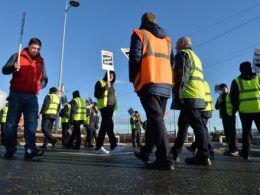When Dell ceased production in Ireland they employed 3,000 workers directly, and the loss of these jobs was correctly seen as devastating for the people involved and the wider economy. Now a similarly huge jobs massacre is being carried out, but this time in the so-called “nationalised” banks.
At every turn in this crisis, capitalism ensures that workers, young people and the unemployed are the ones to pay. The so-called “restructuring” of the banks is just one more example. Former AIB director Colm Doherty has been given a golden handshake of €3 million, while 2,000 ordinary AIB workers, and a further 1,000 from other banks, tellers, admin workers etc., are being thrown onto the dole. This is on top of the 2,000 job losses in the last while in AIB, as a result of positions not being filled.
These are not the bankers who speculated and gambled, who got millions of euro in bonuses, and had a yacht and a Spanish villa. These are the ordinary workers who provided a valuable service, taking your lodgements, handing you out your money, manning the call centres, helping you with your forms and processing your applications.
Most importantly, these are 3,000 jobs that the government-owned banks will be axing. Just like the job losses in Dell, SR Tecnics, Waterford Crystal and beyond, these will have a devastating impact across the economy. This must be resisted. The unions cannot simply role over, accept another 3,000 jobs are gone and negotiate redundancy. Instead, they should fight to defend those jobs, not just for the workers involved, but for the entire community and economy.
Rather than trying to run the banks like private businesses, restoring profitability at the expense of workers and those in need of credit, they should be run democratically as a service to society. Through a structured merger of the various for-profit banks into a democratically controlled, publically owned banking sector, credit could be provided, bondholders burned, and jobs defended.
No jobs should be lost. Any duplication that could be eradicated by merging the banks should be used to free up workers for other socially necessary work, within the new banking service or helping out in other public services which have been starved of staff.
A genuine audit should then be carried out by the workers and trade union movement, to assess the real banking needs of the community, including for instance rural communities, which often lack proper services, and the need to get rid of the queues and long waits which are a feature of most banks.
The one thing that is really unfeasible and unimaginable is for the state and the unions to simply sit-by and watch as thousands more workers are thrown on the dole.












